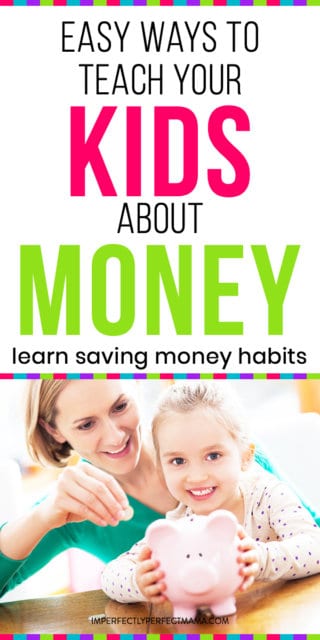I know you’re not into raising a Warren Buffet kid at home.

But neither do you want your child to mature into an adult who’d ALWAYS worry about managing bills, taxes or even the house budget, let alone saving up for some property.
Or do you?
And that calls for teaching money matters to your pre-schooler or kindergartener.
Well, there’s a fairly thick line between training your kid to be ‘money smart’ about saving money when receiving an allowance and being a stingy human.
As a mom, you’d be thrilled to learn some easy and interesting ways to subtly educate your child about financial money habits.
And these habits can stay with your child until adulthood when you’ll see the rewards then as an onlooker.
All this, while learning to be compassionate and generous!
Why Teach About Saving Money toYour Kid?

Because, ultimately, money MATTERS!
Your child needs to know that MONEY – still – is one of the biggest things that run the world. Of course, apart from love, trust, food and water!
Financial literacy, in today’s world, is one of the most critical personal skills and therefore, should be a paramount responsibility that you and I –as parents – have to endure.
For this, I designed my own mnemonic to articulate and instill the concept of money smartness in my daughter. I simply gave her the ‘S.P.A.C.E.’ to learning about money habits and it’s a pretty comprehensive thing to go by.
Show Your Child the ‘SOURCE’
Tell your kid what your source(s) of income is.
If you and your partner both work for a living – or even run a business at home – it’s never too early to explain it to your kid.
Break it down into simple words and let them know that money is earned only after some hustle. For instance, you could most likely make them understand with this, “Dad/I/We earn money for helping our bosses at office. And that’s how we buy your toys and our groceries.”
Take Your Kid to ‘PLACES’
Start early.
To get them know the value of cash versus credit, try taking them along to places where you mostly deal with cash.
The ATM, local stores or even the bank are great conversation starters where you could explain that the basic essence of how money work and boils down to cash. And that hard cash is most apropos of exchange of services.
This, eventually, would make it simpler for you to teach them the cashless concepts of money a little later.
‘ADVERTISEMENTS’ are Not a Big Deal

We’ve always been wary of crazy ads that try to sell the most irrelevant things on TV, phones, billboards or any other premise.
I, for example, tried to desensitize my daughter while she got keen over watching her favorite cartoons on TV. Yeah, right!
Especially the annoying ads of junk food and chokable toys. I hardly spent 2 or 3 minutes after each inapt commercial to tell her why everything that appeared on TV wasn’t useful to us.
It helped me contextually relate this to the perils of consuming junk food or playing with toys which could easily choke or hurt.
Take some time to tell you’re toddler how ads target a particular audience to announce their products. Because, anyways, most of them are intended at encashing our temptations.
And falling for these may often burn holes in our pockets.
Making ‘CHOICES’ is the Key
Our choices as consumers stem either from our needs, wants or sadly, at times, just peer pressure.
Children need to be taught about making choices based on PRIORITIES.
Like it’s always wise to refrain from buying expensive versions of fancy stationery for small kids who don’t boast of a ‘maintenance expertise.’ 🙂
Let your children learn – in rather overnice ways – that their wardrobe doesn’t have to match with their friend’s. Discuss choosing brands, quality and budget along the same lines and help them realize one thing. That monetary choices are indispensable and so is dealing with them.
Decision-making, here I come! 🙂
Be An ‘EXAMPLE’
I’d simply want to reiterate an adage that says “Kids learn more by seeing than hearing.” So, who’d be a better teacher than YOU?
Here’s how you can teach the most precious lessons about money:
1. List-Shopping Vs Impulse Shopping

Always prepare a shopping list before heading out for your grocery.
Because we all have had those days when window shopping turned into impulse shopping.
Only to make you sulk to yourself when the counter guy hands over the bill to you! That’s one huge reason that I personally prefer buying online.
This way, your kid appreciates the importance of narrowing your ‘CHOICES’ about a frame of essential items only. So, no unnecessary expenditure involved. Yippee!
2. Rewards Vs Pocket Money
While many finance experts opine that handing pocket money to children prods them to save money from the beginning, I, however, don’t quite agree to the view.
According to me, pocket money is very likely to come across as ‘free monthly goodie’ to your child. So, kids might never cherish the value of ‘hard-earned’ money, when they are entitled to an allowance that they didn’t ‘earn.’
Instead, you could reward them with some brownie points. Sounds good, huh?
Nah! I’m not telling you to barter your household chores with these tiny creatures for money. 😀
You could very possibly show your appreciation about helping somebody or winning a prize at school with a modest token of some money that they should SAVE. You can further guide them about growing these little amounts over time.
3. Show the Power of Compounding
You basically tell your kid that money, when invested in a bank, GROWS!
If your child is just a kindergartener, lectures about interests and principal would make absolutely no sense. So just tailor your explanation according to your child’s age, as long as he/she understands that investments grow over time.
4. Negotiation is An Art to Nurture

NO! Bargaining – seriously – doesn’t make you look silly, stupid or rude. Why settle for a price that’s deliberately quoted high? And your son needs to know this as much as your girl.
5. Discourage Merchandise-Triggered Stuff
Kids often succumb to advertising gimmicks that sell totally useless products just because there’s a ‘FREE’ favorite merchandise attached with it.
Well, that’s happened to me quite often as a kid. So, I now make sure I sensibly disapprove such buying sprees for my daughter. And, gladly, she’s really zen with it. Touch wood. 🙂
Similarly, discourage buying outfits at extravagant sales that usually launch their, “Buy 3, Get 1 Free,” kind of offers. Most often, we don’t need to buy 3 at a time, unless we’ve gone broke with dresses.
6. Debts Are Nasty
Getting kids to know what happens when they borrow money, either from a friend or on credit (which is the case with credit cards going crazy), is important.
Debts can be an endless trap. Here you get enough material to say, “So, if you don’t want to run into debts, better avoid by managing your money well.”
7. Donate
Raising a tender-hearted kid, while teaching him/her to handle money is also an essential part of parenting.
Allocate a certain portion of savings for charity. You may not be able to mentor an underprivileged child, but try to donate some decent amount to a trust or organization that takes care of such children or aged hearts.
Your child will, thus, surely admire the power of money in the true sense.
Teaching Money Habits to Your Toddler

Whether your child is a toddler, pre-schooler or kindergartner, the earlier you demonstrate smart money saving habits, the better chance that he/she will grow up with the same values.
Is there another way you discuss money matters with your kid? Do let me know in your comments. 🙂




1 Comments